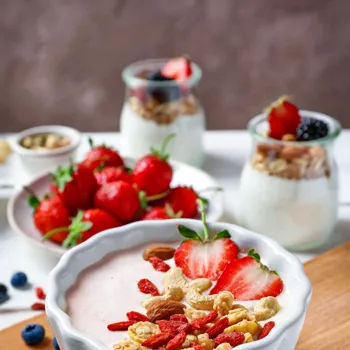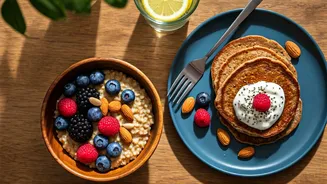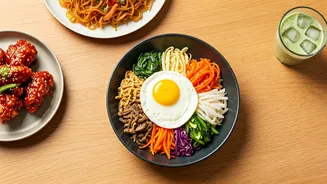Unlocking the Stress-Nutrition Connection: A Path to Inner Calm. Delve into how food choices impact stress management
In the bustling heart of India, where life moves at a frenetic pace, stress has become
an unwelcome companion for many. From the pressures of work to the demands of family life, finding moments of calm can feel like a distant dream.
But what if the key to managing stress lay not just in meditation or yoga, but also in the food we consume? As it turns out, there's a strong connection between stress and nutrition, and understanding this link can empower us to make healthier choices for a more balanced life.
Let's delve into the intricate world of stress and nutrition, exploring how what we eat can significantly impact our ability to cope with challenges and find inner peace.
The Stress-Nutrition Connection: A Two-Way Street
Stress and nutrition are intertwined in a complex dance, each influencing the other. When we're stressed, our bodies release hormones like cortisol, which can disrupt our appetite, digestion, and nutrient absorption.
Some folks find themselves reaching for comfort foods high in sugar and unhealthy fats, while others lose their appetite altogether. These responses can lead to nutritional deficiencies or unhealthy eating habits, further exacerbating stress levels.
On the other hand, what we eat can directly impact our stress response. A diet lacking in essential nutrients can weaken our body's ability to cope with stress, making us more susceptible to anxiety, irritability, and fatigue.
Conversely, a diet rich in whole foods, vitamins, and minerals can strengthen our resilience and help us navigate stressful situations with greater ease.
In essence, the relationship between stress and nutrition is a two-way street.
Stress can negatively impact our eating habits, and poor nutrition can make us more vulnerable to stress. However, by understanding this connection, we can take proactive steps to nourish our bodies and minds, building a foundation for greater calm and well-being.
Foods That Fight Stress: A Guide to Calming Cuisine
So, what foods can help us combat stress and foster a sense of tranquility? The good news is that a variety of delicious and readily available options can support our mental and emotional well-being. Let's explore some of the top contenders:
Leafy Green Vegetables
Spinach, kale, and other leafy greens are packed with magnesium, a mineral that plays a crucial role in regulating mood and reducing anxiety.

Magnesium deficiency has been linked to increased stress and depression, so incorporating these greens into your diet can be a simple yet effective way to boost your resilience. Squeeze them into smoothies, add them to salads, or simply sauté them as a side dish.
Nuts and Seeds
Almonds, walnuts, sunflower seeds, and flax seeds are excellent sources of healthy fats, protein, and fiber, all of which contribute to stable blood sugar levels and sustained energy.
These snacks also contain important nutrients like vitamin E and zinc, which are known for their antioxidant and mood-boosting properties. A handful of nuts or seeds can be a satisfying and stress-relieving snack.
Whole Grains
Oats, brown rice, and quinoa are complex carbohydrates that provide a steady release of energy, preventing the blood sugar spikes and crashes that can trigger mood swings and anxiety.
These grains are also rich in fiber, which promotes digestive health and reduces inflammation, both of which can be influenced by stress. Opt for whole grains over processed carbohydrates like white bread and sugary cereals for a more balanced and calming effect.
Fruits
Berries, bananas, and citrus fruits are bursting with vitamins, minerals, and antioxidants that can help protect our bodies from the damaging effects of stress.
Berries are rich in vitamin C, which supports the adrenal glands, while bananas provide potassium and magnesium, both essential for muscle relaxation and mood regulation.
Citrus fruits are known for their immune-boosting properties, which can be particularly helpful when stress weakens our defenses.
Legumes
Lentils, chickpeas, and beans are excellent sources of protein, fiber, and complex carbohydrates, providing sustained energy and promoting feelings of fullness. Legumes also contain important nutrients like folate and iron, which are essential for brain health and mood regulation.
Incorporate legumes into soups, stews, salads, or as a side dish for a hearty and stress-relieving meal.
Yogurt: Yogurt, a beloved part of the Indian diet, is teeming with protein. Try and go for plain, unsweetened variety to keep sugar at bay. These probiotics can aid in improving digestion.
Practical Tips for Stress-Free Eating:
Besides incorporating specific foods into your diet, there are several practical strategies you can implement to promote stress-free eating and nourish your body and mind:

Plan Your Meals
Taking the time to plan your meals and snacks can help you make healthier choices and avoid impulsive decisions when you're feeling stressed. Create a weekly menu, prepare ingredients in advance, and pack healthy snacks to have on hand when hunger strikes.
Practice Mindful Eating
Pay attention to your hunger cues and eat when you're truly hungry. Avoid eating in front of the television or while working, as this can lead to overeating and mindless snacking. Savor each bite, focus on the taste and texture of your food, and chew thoroughly.
Stay Hydrated
Dehydration can exacerbate stress symptoms like fatigue, headaches, and irritability. Aim to drink at least eight glasses of water per day, and choose hydrating beverages like herbal tea and infused water over sugary drinks.
Limit Processed Foods
Processed foods are often high in sugar, unhealthy fats, and additives, which can disrupt blood sugar levels, increase inflammation, and negatively impact mood. Limit your intake of processed snacks, fast food, and sugary drinks, and focus on whole, unprocessed foods instead.
Don't Skip Meals
Skipping meals can lead to blood sugar crashes, which can trigger anxiety and irritability. Make sure to eat regular meals throughout the day, even when you're feeling busy or stressed. Keep healthy snacks on hand to prevent hunger pangs and maintain stable energy levels.
Seek Professional Guidance: If you're struggling to manage stress or make healthy food choices, consider seeking guidance from a registered dietitian or therapist. They can provide personalized advice and support to help you develop a sustainable and stress-reducing eating plan.
Paragraph 1:
The fast-paced life in India often leads to heightened stress levels. People juggle multiple responsibilities, from demanding jobs to family commitments, leaving little time for self-care. This constant pressure can wreak havoc on both physical and mental well-being.
Understanding the link between stress and nutrition becomes crucial for maintaining a balanced and healthy lifestyle amidst the chaos. Learning calming food helps improve.
Paragraph 2:
When stressed, the body releases cortisol, impacting appetite.
Some crave sugary comfort foods, further increasing harmful cholesterol. This results in health issues. Others lose appetite and suffer from malnutrition. Making informed food choices reduces stress. Eating mindfully is a crucial aspect.
Paragraph 3:
Leafy Spinach are rich in magnesium reducing anxiety and supporting overall mood regulation. Adding nuts like almonds can ease a stressful mind. Add seeds and healthy fat to help you stay.
Paragraph 4:
Switch from refined products to grains like oats, quinoa, and even brown rice.
They release slow and steady energy from your body.
Paragraph 5:
Berries like strawberries, blueberries are good source of Vitamins. These helps to keep your mind at peace.
Paragraph 6:
Avoid eating frequently, give time for gaps in between meals.
A mindful way to eat is a great way for calm eating. Seeking professional guidance will help.
Embracing a Holistic Approach to Stress Management:
While nutrition plays a vital role in stress management, it's important to remember that it's just one piece of the puzzle.
A holistic approach to well-being involves incorporating various strategies to support both physical and mental health. This may include practicing mindfulness, engaging in regular exercise, getting enough sleep, spending time in nature, and connecting with loved ones.
By combining healthy eating habits with other stress-reducing practices, you can create a powerful recipe for resilience, balance, and inner peace. Remember, nourishing your body and mind is an act of self-care, and it's an investment that will pay dividends in your overall well-being.
So, take a deep breath, reach for a wholesome snack, and embark on a journey towards a calmer, healthier, and more fulfilling life. The journey of a thousand miles starts with one single step.
AI Generated Content. Glance/InMobi shall have no liability for the content











